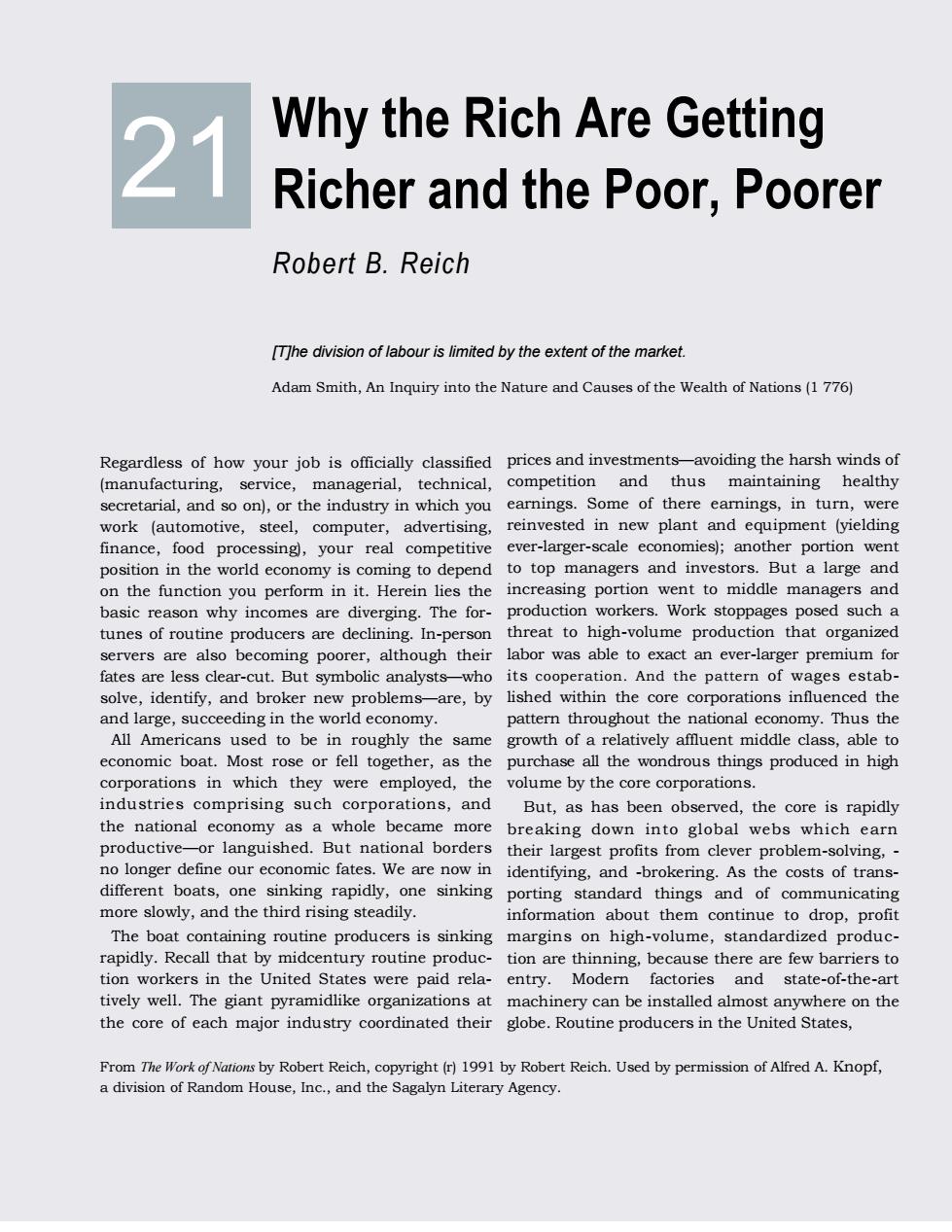正在加载图片...

21 Why the Rich Are Getting Richer and the Poor,Poorer Robert B.Reich [T]he division of labour is limited by the extent of the market. Adam Smith,An Inquiry into the Nature and Causes of the Wealth of Nations(1 776) Regardless of how your job is officially classified prices and investments-avoiding the harsh winds of (manufacturing,service,managerial,technical,competition and thus maintaining healthy secretarial,and so on),or the industry in which you earnings.Some of there earnings,in turn,were work (automotive,steel,computer,advertising,reinvested in new plant and equipment (yielding finance,food processing),your real competitive ever-larger-scale economies);another portion went position in the world economy is coming to depend to top managers and investors.But a large and on the function you perform in it.Herein lies the increasing portion went to middle managers and basic reason why incomes are diverging.The for-production workers.Work stoppages posed such a tunes of routine producers are declining.In-person threat to high-volume production that organized servers are also becoming poorer,although their labor was able to exact an ever-larger premium for fates are less clear-cut.But symbolic analysts-who its cooperation.And the pattern of wages estab- solve,identify,and broker new problems-are,by lished within the core corporations influenced the and large,succeeding in the world economy. pattern throughout the national economy.Thus the All Americans used to be in roughly the same growth of a relatively affluent middle class,able to economic boat.Most rose or fell together,as the purchase all the wondrous things produced in high corporations in which they were employed,the volume by the core corporations. industries comprising such corporations,and But,as has been observed,the core is rapidly the national economy as a whole became more breaking down into global webs which earn productive-or languished.But national borders their largest profits from clever problem-solving,- no longer define our economic fates.We are now in identifying,and-brokering.As the costs of trans- different boats,one sinking rapidly,one sinking porting standard things and of communicating more slowly,and the third rising steadily. information about them continue to drop,profit The boat containing routine producers is sinking margins on high-volume,standardized produc- rapidly.Recall that by midcentury routine produc-tion are thinning,because there are few barriers to tion workers in the United States were paid rela-entry.Modern factories and state-of-the-art tively well.The giant pyramidlike organizations at machinery can be installed almost anywhere on the the core of each major industry coordinated their globe.Routine producers in the United States From The Work of Nations by Robert Reich,copyright(r)1991 by Robert Reich.Used by permission of Alfred A.Knopf, a division of Random House,Inc.,and the Sagalyn Literary Agency.21 Why the Rich Are Getting Richer and the Poor, Poorer Robert B. Reich [T]he division of labour is limited by the extent of the market. Adam Smith, An Inquiry into the Nature and Causes of the Wealth of Nations (1 776) Regardless of how your job is officially classified (manufacturing, service, managerial, technical, secretarial, and so on), or the industry in which you work (automotive, steel, computer, advertising, finance, food processing), your real competitive position in the world economy is coming to depend on the function you perform in it. Herein lies the basic reason why incomes are diverging. The fortunes of routine producers are declining. Inperson servers are also becoming poorer, although their fates are less clearcut. But symbolic analysts—who solve, identify, and broker new problems—are, by and large, succeeding in the world economy. All Americans used to be in roughly the same economic boat. Most rose or fell together, as the corporations in which they were employed, the industries comprising such corporations, and the national economy as a whole became more productive—or languished. But national borders no longer define our economic fates. We are now in different boats, one sinking rapidly, one sinking more slowly, and the third rising steadily. The boat containing routine producers is sinking rapidly. Recall that by midcentury routine production workers in the United States were paid relatively well. The giant pyramidlike organizations at the core of each major industry coordinated their prices and investments—avoiding the harsh winds of competition and thus maintaining healthy earnings. Some of there earnings, in turn, were reinvested in new plant and equipment (yielding everlargerscale economies); another portion went to top managers and investors. But a large and increasing portion went to middle managers and production workers. Work stoppages posed such a threat to highvolume production that organized labor was able to exact an everlarger premium for its cooperation. And the pattern of wages established within the core corporations influenced the pattern throughout the national economy. Thus the growth of a relatively affluent middle class, able to purchase all the wondrous things produced in high volume by the core corporations. But, as has been observed, the core is rapidly breaking down into global webs which earn their largest profits from clever problemsolving, identifying, and brokering. As the costs of transporting standard things and of communicating information about them continue to drop, profit margins on highvolume, standardized production are thinning, because there are few barriers to entry. Modern factories and stateoftheart machinery can be installed almost anywhere on the globe. Routine producers in the United States, From The Work of Nations by Robert Reich, copyright (r) 1991 by Robert Reich. Used by permission of Alfred A. Knopf, a division of Random House, Inc., and the Sagalyn Literary Agency